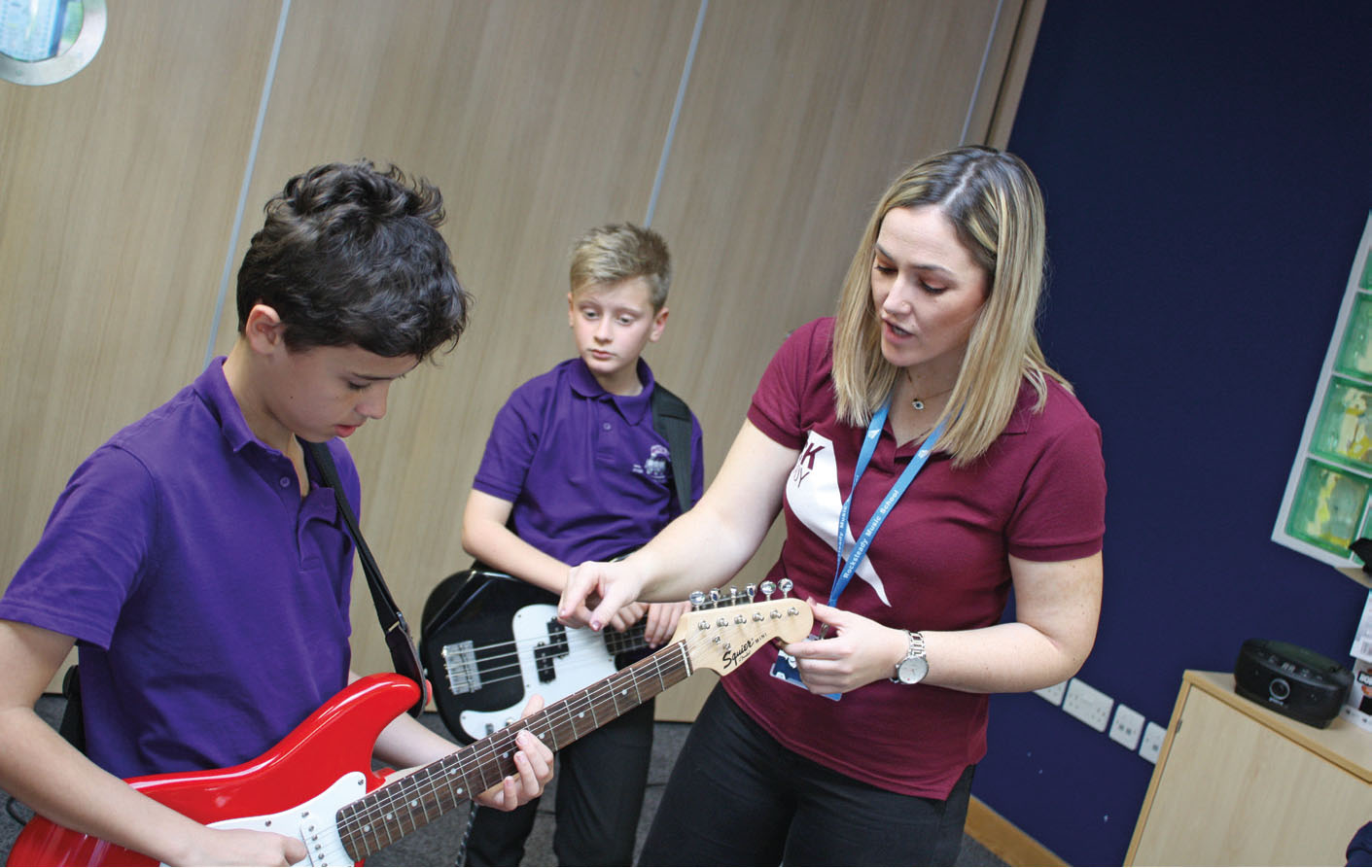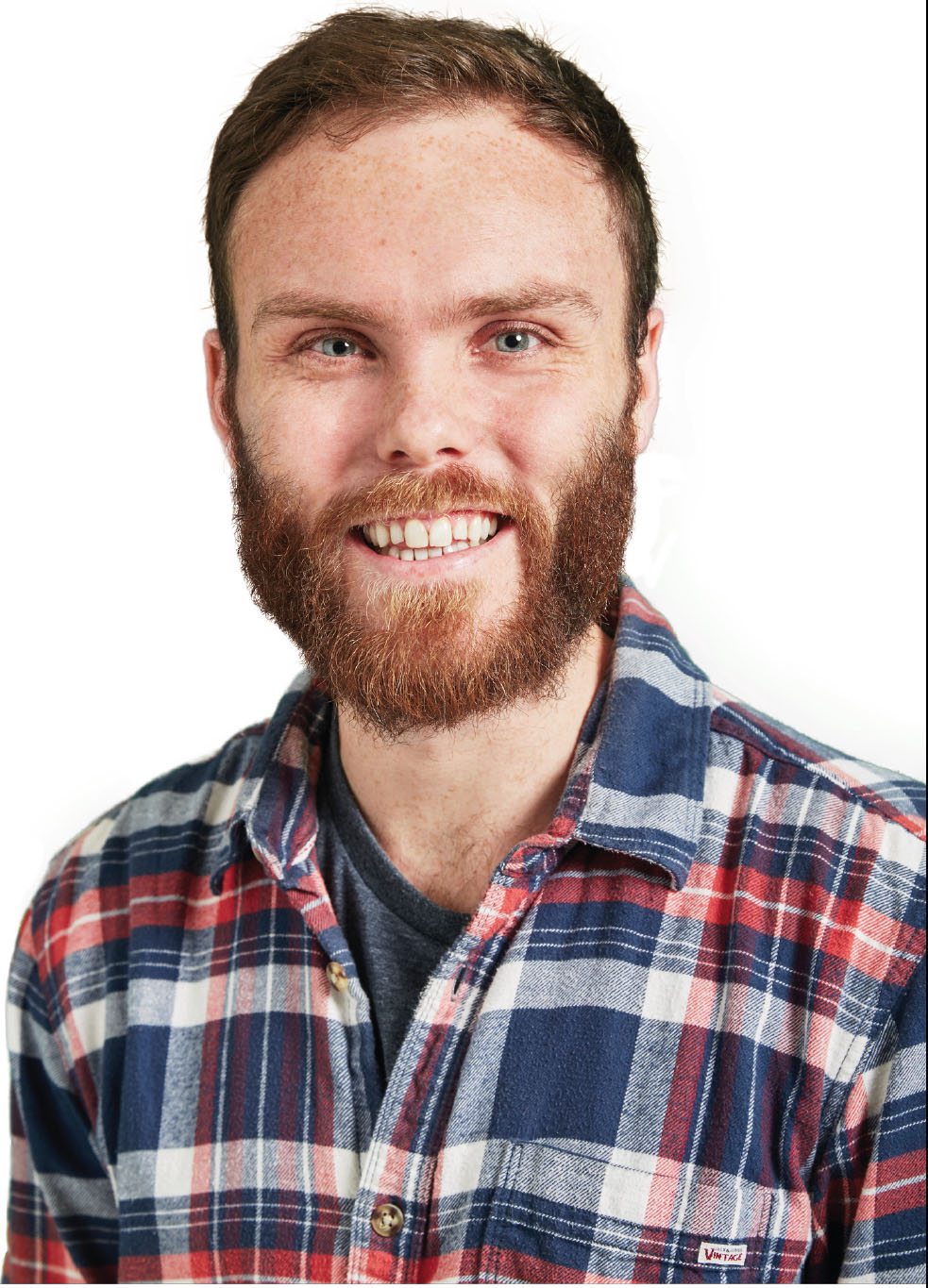
In 2007, guitar teacher Mark Robinson founded Rocksteady Music School in Portsmouth, a peri teaching organisation specialising in rock band lessons and workshops in primary schools. At first, the company was small and contained within an area that Robinson could reasonably cover in a working week. Over ten years later, Rocksteady has over 100 full-time teaching staff, delivering its distinctive brand of rock and pop music education. So what's the attraction, and what has made its approach so successful?
A typical Rocksteady session seems to sit somewhere in between an instrumental lesson, a band rehearsal and a workshop. In groups of up to nine, students learn the rudiments of either drums, keys, guitar or vocals, and over several weeks put together a performance for their peers, guided by a Rocksteady band leader. The tuition is almost all aural, focusing on rhythm skills, listening and teamwork. Students work from lyric sheets and memorise the structure of pieces as they go, sometimes working with backing tracks for existing songs and sometimes performing devised material, based on notes, themes or rhythms they have studied. While basic technical aspects of the instruments are covered, learning theory and notation are not primary goals. Any child willing to have a go, regardless of previous experience, skill level or ability is welcome.
One of the most positive aspects is the immediate focus on ensemble skills. Typically, joining an ensemble is seen as a second stage following on from basic mastery of the instrument but by starting with this aspect and combining instrumental skills with creating a performance, initial progress rates can be fast, thanks to the collective motivation to succeed. ‘It's not anything magical that we're doing – it's the positive peer pressure from each other,’ says Robinson. ‘They're doing something they really want to do, meaning their concentration and focus is heightened in that half hour.’
Too good to be true?
Purely from a music education perspective, this one-size-fits-all approach could be seen as divisive, and I can understand why instrumental teachers have often been resistant. I ask Robinson if he has encountered suspicion from other music education providers, and he says that most of the time they don't criticise openly, but that ‘you catch wind of ideas that we go in exciting children with guitars and drums and not actually teaching them anything – but that couldn't be further from the truth. The whole thing is based on very meaningful results.’
Meaningful and measurable results aren't quite the same thing and I'm still not totally convinced that progression pathways for the most able are adequately built into the model, but to be fair to Rocksteady, they don't ever claim to fully replace instrumental lessons. The two can co-exist quite happily, as I discover from Northamptonshire Music and Performing Arts Trust. Following a recent partnership, the headteacher of Lyncrest Primary School David Bowden says: ‘With the addition of Rocksteady we are merely adding further enrichment to their musical education. The children are learning a more formal system of music and at the same time a more expressive and experimental version.’ Bowden had initially expressed concern that instrumental lesson uptake would suffer with the introduction of Rocksteady sessions, but this was not the case. In fact, it seemed that the more informal workshops had a positive impact on music lesson uptake as a whole, perhaps helping to persuade undecided or inexperienced students of the value of learning an instrument.

Anna is another one of the Rocksteady band leaders
In addition to this, the Rocksteady methodology seems to offer a particularly effective pathway for those who lack confidence, or perhaps have struggled in school for any number of reasons. One of the successful aspects of the model seems to be its ability to – quite literally – help children to find their voice. Robinson tells me that ‘at least five times in the last year’ sessions have caused children presenting as mute or selectively mute to speak, leading to improved communication skills beyond music lessons in some cases. There's a story of another early occasion when he invited a musical but disruptive child to join a newly-formed band for the school concert. When the student was first approached, his initial reaction was ‘What have I done now?’, but it proved to be a turning point from which he blossomed, eventually becoming a school prefect. Perhaps some of this is just the power of music – which sounds a little trite on paper – but inclusivity and teamwork are core values for Rocksteady, perhaps in a way that is not evident in all music lessons. ‘Once I saw this impact I thought we were hitting on something that could be really transformational,’ says Robinson. ‘I felt we had a responsibility to get this to as many children as possible.’
Once more with feeling
There's no doubt that Rocksteady has found an inspiring ‘way in’, offering students the chance to experience playing an instrument with minimal stress, and feeding their ambitions to emulate their popular musical heroes. Another facet of this is the video gallery on the Rocksteady website, which highlights several student performances each week for parents and schools to see – and perhaps for playground bragging rights. As part of these performances, children often introduce themselves as a band, showing attitude and enthusiasm, and some have even had time to take an ‘official’ band photo. Approaching tuition this way is a surefire way to get the participants on side, and it seems to be working. In February, cities including Birmingham, Bristol, Leeds and Manchester hosted free workshops themed around the songs of The Foo Fighters in an event called ‘Rocksteady: Just PLAY Foo Fighters’, fully sanctioned by the group itself. Large-scale days such as this seem to be at the core of Rocksteady's marketing plans, as they target continued expansion. The growth has been startlingly quick: in July 2016, Rocksteady taught 5,000 students per week, but they now have around 22,000 enrolled as of January 2019, as well as another 200,000 participants annually in other Rocksteady events, such as free school workshops, one-off performance days and charity partnerships.
I ask Robinson what else he wants to achieve and about funding. As a purely private enterprise, Rocksteady is not required to offer free or discounted provision. However, as their reach increases, he says that one of their main priorities is to find more ways to fund lessons for those who are unable to afford it. The current company policy is to offer one or two bursary-funded places per school, but further discounted places only exist in partnership with the school's resources. And the future? ‘I run more off intentions than plans,’ he says. ‘You have to have short term goals to get you to your next stage but our overall intention is the same – to empower as many children as possible through music.’

Mark Robinson, founder of Rocksteady








